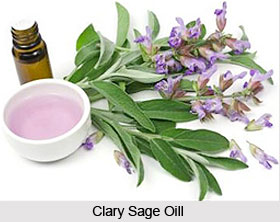 Clary Sage oil`s greatest benefit lies in its calming and sedating influence on the nerves, emotions, female functions, kidneys and digestive system. It has a warming or neutral energy that directly acts on skin, nerves and reproductive tissues. Clary Sage works wonders on woman`s psyche and physical problems like monthly cycles. In addition to its relaxing and cramp-relieving properties, it is known to be euphoric. It is especially effective at feeding estrogen directly into the skin.
Clary Sage oil`s greatest benefit lies in its calming and sedating influence on the nerves, emotions, female functions, kidneys and digestive system. It has a warming or neutral energy that directly acts on skin, nerves and reproductive tissues. Clary Sage works wonders on woman`s psyche and physical problems like monthly cycles. In addition to its relaxing and cramp-relieving properties, it is known to be euphoric. It is especially effective at feeding estrogen directly into the skin.
Derivation
The name is derived from the Latin `Claris` that means `clear` or from the Greek `Skeria` meaning `hardness`, referring to the hard parts of the flower petals. Clary Sage was known in the Middle Ages as `Oculus Christi` - the `Eye of Christ` and was a highly esteemed medicine.
Origin
It is a native to southern Europe and is a stout biennial herb that grows up to 1m tall with large, hairy leaves and small blue/ white flowers growing directly off the long, thin stem. It is cultivated for oil production in France and Russia.
Extraction
Clary sage oil is extracted by steam distillation from the flowering tops and the leaves.
Health Benefits of Clary Sage Oil
The health benefits of Clary Sage Oil can be attributed to its properties as an antidepressant, anticonvulsive, antispasmodic, antiseptic, aphrodisiac, astringent, bactericidal, carminative, deodorant, digestive, emenagogue, euphoric, hypertensive, nervine, sedative, stomachic, uterine and nerve tonic.
Other Benefits: Clary Sage essential oil can be used to fight addiction particularly drugs and can stimulate a change in mentality towards a positive way of approaching life. Furthermore, it is anti-inflammatory in nature and can treat back aches and joint pain. In terms of skin care, it can help to regulate excess sebum production and prevent acne from forming. It also eases labor and reduces labor pains.
Uses of Clary Sage Oil
•Clary sage is calming to the nervous system, particularly in cases of depression, stress, insomnia and deep seated tension.
•It furthermore is a good tonic for the womb and female functions in general, such as painful periods, scanty menstruation and relaxation during labor, thus encouraging a less painful birth.
•During menopause, clary sage oil can help reduce hot flushes, night sweats, palpitations, irritability, as well as headaches and dizziness.
•It is good for muscle pains, digestive disorders, kidney diseases and the cooling of inflammation of the skin.
•It also helps with skin conditions like acne, boils and ulcers and cools painful muscles and joints.
•Clary sage has a rejuvenating effect on the endocrine system. It balances the pituitary gland.
•It can be also used in case of bronchitis, asthma, PMS, childbirth tensions, frigidity, impotence and swollen tissues.
Caution: It can enhance the intoxicating effects of alcohol and other narcotics, since it is a relaxant and a sedative by nature. Heavy dosage can also cause headaches. Pregnant or nursing women should avoid using it.
Blending: Clary Sage Oil blends very well with oils of Lemon, Lime, Orange and other citrus fruits as well as Lavender, Pine, Juniper, Geranium, Sandal Wood, Jasmine, Frankincense, Bergamot, Cinnamon, Rosewood, Coriander, Cardamom, and Cedarwood oils.




















